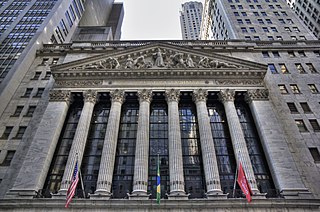Related Research Articles

A stock exchange, securities exchange, or bourse, is an exchange where stockbrokers and traders can buy and sell securities, such as shares of stock, bonds, and other financial instruments. Stock exchanges may also provide facilities for the issue and redemption of such securities and instruments and capital events including the payment of income and dividends. Securities traded on a stock exchange include stock issued by listed companies, unit trusts, derivatives, pooled investment products and bonds. Stock exchanges often function as "continuous auction" markets with buyers and sellers consummating transactions via open outcry at a central location such as the floor of the exchange or by using an electronic trading platform.

A security is a tradable financial asset. The term commonly refers to any form of financial instrument, but its legal definition varies by jurisdiction. In some countries and languages people commonly use the term "security" to refer to any form of financial instrument, even though the underlying legal and regulatory regime may not have such a broad definition. In some jurisdictions the term specifically excludes financial instruments other than equities and Fixed income instruments. In some jurisdictions it includes some instruments that are close to equities and fixed income, e.g., equity warrants.
An initial public offering (IPO) or stock launch is a public offering in which shares of a company are sold to institutional investors and usually also to retail (individual) investors. An IPO is typically underwritten by one or more investment banks, who also arrange for the shares to be listed on one or more stock exchanges. Through this process, colloquially known as floating, or going public, a privately held company is transformed into a public company. Initial public offerings can be used to raise new equity capital for companies, to monetize the investments of private shareholders such as company founders or private equity investors, and to enable easy trading of existing holdings or future capital raising by becoming publicly traded.

In finance, being short in an asset means investing in such a way that the investor will profit if the value of the asset falls. This is the opposite of a more conventional "long" position, where the investor will profit if the value of the asset rises.

Day trading is a form of speculation in securities in which a trader buys and sells a financial instrument within the same trading day, so that all positions are closed before the market closes for the trading day to avoid unmanageable risks and negative price gaps between one day's close and the next day's price at the open. Traders who trade in this capacity are generally classified as speculators. Day trading contrasts with the long-term trades underlying buy-and-hold and value investing strategies. Day trading may require fast trade execution, sometimes as fast as milli-seconds in scalping, therefore a direct-access day trading software is often needed.
In financial services, a broker-dealer is a natural person, company or other organization that engages in the business of trading securities for its own account or on behalf of its customers. Broker-dealers are at the heart of the securities and derivatives trading process.

A market maker or liquidity provider is a company or an individual that quotes both a buy and a sell price in a tradable asset held in inventory, hoping to make a profit on the bid–ask spread, or turn. The function of a market maker is to help limit price variation (volatility) by setting a limited trading price range for the assets being traded.

The Securities Exchange Act of 1934 is a law governing the secondary trading of securities in the United States of America. A landmark of wide-ranging legislation, the Act of '34 and related statutes form the basis of regulation of the financial markets and their participants in the United States. The 1934 Act also established the Securities and Exchange Commission (SEC), the agency primarily responsible for enforcement of United States federal securities law.
Algorithmic trading is a method of executing orders using automated pre-programmed trading instructions accounting for variables such as time, price, and volume. This type of trading attempts to leverage the speed and computational resources of computers relative to human traders. In the twenty-first century, algorithmic trading has been gaining traction with both retail and institutional traders. It is widely used by investment banks, pension funds, mutual funds, and hedge funds that may need to spread out the execution of a larger order or perform trades too fast for human traders to react to. A study in 2019 showed that around 92% of trading in the Forex market was performed by trading algorithms rather than humans.

An auction rate security (ARS) typically refers to a debt instrument with a long-term nominal maturity for which the interest rate is regularly reset through a Dutch auction. Since February 2008, most such auctions have failed, and the auction market has been largely frozen. In late 2008, investment banks that had marketed and distributed auction rate securities agreed to repurchase most of them at par.
A crossing network is an alternative trading system (ATS) that matches buy and sell orders electronically for execution without first routing the order to an exchange or other displayed market, such as an electronic communication network (ECN), which displays a public quote. These broker-dealers employ computerized systems to match buyers and sellers of large blocks of shares without using the stock exchange. Depending on the particular broker-dealer's system and the type of securities traded, these crosses could occur at various times during the day, or after the close of trading, and could be priced at the last sale price or some other objective price, such as the midpoint between the bid and offer or the volume weighted average price (VWAP). The advantage of the crossing network is the ability to execute a large block order without impacting the public quote. Crossing networks tend to be used for highly liquid stocks and offer money managers the advantages of very low commissions, anonymity for the buying or selling account, and avoidance of market impact.
Direct market access (DMA) is a term used in financial markets to describe electronic trading facilities that give investors wishing to trade in financial instruments a way to interact with the order book of an exchange. Normally, trading on the order book is restricted to broker-dealers and market making firms that are members of the exchange. Using DMA, investment companies and other private traders use the information technology infrastructure of sell side firms such as investment banks and the market access that those firms possess, but control the way a trading transaction is managed themselves rather than passing the order over to the broker's own in-house traders for execution. Today, DMA is often combined with algorithmic trading giving access to many different trading strategies. Certain forms of DMA, most notably "sponsored access", have raised substantial regulatory concerns because of the possibility of a malfunction by an investor to cause widespread market disruption.
A direct public offering (DPO) or direct listing is a method by which a company can offer an investment opportunity directly to the public.

Microcap stock fraud is a form of securities fraud involving stocks of "microcap" companies, generally defined in the United States as those with a market capitalization of under $250 million. Its prevalence has been estimated to run into the billions of dollars a year. Many microcap stocks are penny stocks, which the SEC defines as a security that trades at less than $5 per share, is not listed on a national exchange, and fails to meet other specific criteria.

In finance, a dark pool is a private forum for trading securities, derivatives, and other financial instruments. Liquidity on these markets is called dark pool liquidity. The bulk of dark pool trades represent large trades by financial institutions that are offered away from public exchanges like the New York Stock Exchange and the NASDAQ, so that such trades remain confidential and outside the purview of the general investing public. The fragmentation of electronic trading platforms has allowed dark pools to be created, and they are normally accessed through crossing networks or directly among market participants via private contractual arrangements. Generally, dark pools are not available to the public, but in some cases, they may be accessed indirectly by retail investors and traders via retail brokers.
Instinet is an institutional, agency-model broker that also serves as the independent equity trading arm of its parent, Nomura Group. It executes trades for asset management firms, hedge funds, insurance companies, mutual funds and pension funds. Headquartered in New York City, the company provides sales trading services and trading technologies such as the Newport EMS, algorithms, trade cost analytics, commission management, independent research and dark pools.
Flash trading, otherwise known as a flash order, is a marketable order sent to a market center that is not quoting the industry's best price or that cannot fill that order in its entirety. The order is then flashed to recipients of the venue's proprietary data feed to see if any of those firms wants to take the other side of the order.

Virtu Financial is an American company that provides financial services, trading products and market making services. Virtu provides product suite including offerings in execution, liquidity sourcing, analytics and broker-neutral, multi-dealer platforms in workflow technology and two-sided quotations and trades in equities, commodities, currencies, options, fixed income, and other securities on over 230 exchanges, markets, and dark pools. Virtu uses proprietary technology to trade large volumes of securities. The company went public on the Nasdaq in 2015.
Axis Direct is the flagship brand under Axis Securities Limited, a subsidiary of Axis Bank in India. Providing Demat and Trading services. Its main offices are in Mumbai. The company employs over 2,100 people.

Securities market participants in the United States include corporations and governments issuing securities, persons and corporations buying and selling a security, the broker-dealers and exchanges which facilitate such trading, banks which safe keep assets, and regulators who monitor the markets' activities. Investors buy and sell through broker-dealers and have their assets retained by either their executing broker-dealer, a custodian bank or a prime broker. These transactions take place in the environment of equity and equity options exchanges, regulated by the U.S. Securities and Exchange Commission (SEC), or derivative exchanges, regulated by the Commodity Futures Trading Commission (CFTC). For transactions involving stocks and bonds, transfer agents assure that the ownership in each transaction is properly assigned to and held on behalf of each investor.
References
- 1 2 "Indication of Interest - IOI". Investopedia.com. Retrieved 6 January 2010.
- ↑ "Regulatory Notice 09-28" (PDF). Financial Industry Regulatory Authority (FINRA). November 2009. Retrieved 6 January 2010.
- ↑ "Don't Be Afraid Of The Dark Pools". Forbes (Forbes). Retrieved 6 December 2012.